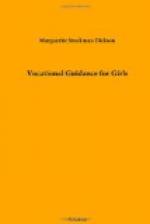We have already noted how this power might be used to regulate not only the quality but the character of products in the factories. If women merely passed by the outlandish hats, the high heels, the hobble skirts, of fashion, their stay would necessarily be short. The woman, therefore, if she choose, is absolutely the controller of production along most lines of food and raiment. That she shall use this controlling power wisely is one of her obligations. And to meet the obligation she must be wisely trained.
It would seem that the homemaker, as we have conceived her, has a part in most of the concerns of the community. We speak of “woman and citizenship.” To many this means, perhaps, “woman and suffrage.” Woman in politics is already an accomplished fact in fourteen western states. Suffrage has been granted her in the state of New York. That her political influence will widen seems a foregone conclusion. She must therefore be prepared for real service in civic concerns. Women have already applied their housecleaning knowledge and skill to the smaller near-by problems of civic life. As time goes on they must render the same service to state and nation.
We shall soon see nation-wide “votes for women,” in our own country, at least. But whether we do or not, or until we do, woman and citizenship are, as they have always been, closely linked together. In every community relation the homemaker is the good, or indifferent, or bad citizen; and in every home relation she is the citizen still, and, more than that, the mother of future citizens.
In spite of the “uneasy women” who feel that the home offers insufficient scope for their intellectual powers, the executive ability required to run a home smoothly and well is of no mean order. “This being a mother is a complicated business,” as one mother of my acquaintance expresses it. Can we afford to have homemaking underrated as a vocation, to be avoided or entered into lightly, often with neither natural aptitude nor training to serve as guide to the “complications”? It would seem not. We must then consider “guidance toward homemaking” as a necessary part of a girl’s education and as a possible solution of the home problems on every hand.
We have thus far in this book concerned ourselves with making plain our ideal of girlhood and womanhood and with considering the problems which our girl and woman, when we have done our best to prepare her, will have to meet. We have thus far not concerned ourselves with the questions of how, when, and where the work of preparation is to be done. A clear vision of the end to be attained, not obscured by thought of the means used in reaching it, seems a necessity. From this we may pass on to careful, detailed consideration of agencies and methods. Knowing what we desire our girls to be, we may enlist all the forces which react upon girls to make them into what we desire.




